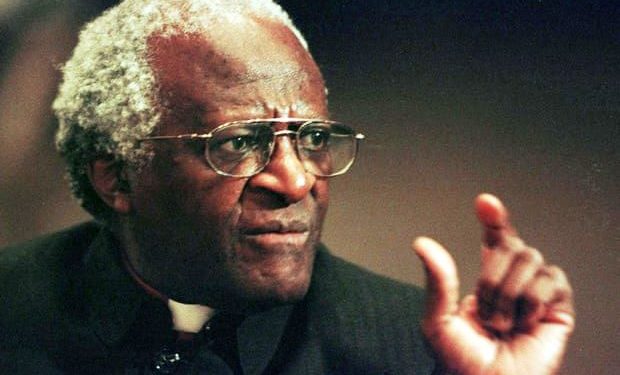Archbishop Desmond Tutu, 1984 Nobel Peace prize laureate who helped end apartheid in South Africa, last December 26, died aged 90.
South Africa organized a state funeral for the late Archbishop. His requiem mass was programmed to place on Saturday, January 1st in the Saint George’s Cathedral in Cape Town, to be attended by family ,friends, clergy and politicians including President Cyril Ramaphosa.
Tutu had requested a funeral without lavish expense.He was expected to be laid to rest on Sunday January 2nd in the Cape Town cathedral where he once preached against the brutal white-minority regime.
Tutu , often described as the moral conscience of his nation, died in Cape Town.
The cleric and social critic was diagnosed with prostate cancer in the late 1990s and in recent years he was hospitalized on several occasions to treat infections associated with his treatment, according to The Guardian.
“ Ultimately,at the age of 90,he died peacefully at the Oasis Frail Care Centre in Cape Town [ on December 26],” Dr Ramhela Mamphele,acting chairman of the Archbishop Desmond Tutu IP Trust and coordinator of the Office of the Archbishop,said in a statement on behalf of the Tutu family. She did not give details on the cause of death.
According to the BBC, South Africa’s President Cyril Ramaphosa said the churchman’s death marked “another chapter of bereavement in our nation’s farewell to a generation of outstanding South Africans”.
He said Archbishop Tutu had helped bequeath “a liberated South Africa”.
Tutu was one of the country’s best known figures at home and abroad.
A contemporary of anti-apartheid icon Nelson Mandela, he fought very hard to end the policy of racial segregation and discrimination enforced by the white minority government against the black majority in South Africa from 1948 until 1991.
He won the Nobel Prize in 1984 for his role in the struggle to abolish the apartheid system.
Tutu died just weeks after South Africa’s last apartheid-era president, FW de Clerk, died aged 85.
President Ramaphosa said Tutu was “an iconic spiritual leader, anti-apartheid activist and global human rights campaigner”.
He described him as “a patriot without equal; a leader of principle and pragmatism who gave meaning to the biblical insight that faith without works is dead.
“A man of extraordinary intellect, integrity and invincibility against the forces of apartheid, he was also tender and vulnerable in his compassion for those who had suffered oppression, injustice and violence under apartheid, and oppressed and downtrodden people around the world.”
According to The Guardian, “Tutu was born in Klerksdorp, a farming town 100 miles (160km) south-west of Johannesburg. The sickly son of a headteacher and a domestic servant, he trained first as a teacher before becoming an Anglican priest.
“As a cleric, he travelled widely, gaining an MA in theology from London University. Though he only emerged as a key figure in the liberation struggle in the mid-1970s, he was to have a huge impact, becoming a household name across the globe.”
The Guardian writes that, Tutu was a vocal supporter of sanctions against South Africa, and was detested by supporters of the apartheid regime, who saw him as an agitator and traitor. “Tutu was however protected not just by his wit and combative spirit but by his immense popularity and respect,” the paper says.
In 1986 he was appointed archbishop of Cape Town, the effective head of the Anglican church in his homeland.
According to The Guardian, Tutu always kept his distance from the African National Congress (ANC), the party which spearheaded the liberation movement and has now been in power in South Africa for more than 20 years. He refused to back its armed struggle and support unconditionally leaders such as Nelson Mandela.
However, Tutu shared Mandela’s vision of a multiracial society in which all communities live together without rancour or discrimination and is credited with coining the phrase “rainbow nation” to describe this vision.
After the nation’s first free election in 1994, Mandela, who had become the president of a free South Africa, asked Tutu to chair of the Truth and Reconciliation Commission (TRC), the controversial and emotional hearings into apartheid-era human rights abuses.
The TRC was described as the “climax of Tutu’s career” and lauded across the world as a pioneering effort to heal deep historic wounds. However, Tutu found the experience deeply traumatic. He was saddened and perplexed by the ferocious criticism from the white rightwing, some mainstream liberals and the ANC. The terrible testimony that he listened to day after day brought deep emotional stress too, with TV viewers watching as the tough, witty cleric put his head in his hands and wept.
The Guardian reports that in late 1990s, Tutu, suffering prostate cancer, began to spend more time with his wife of 60 years, four children, and grandchildren. He continued to criticise the ANC and was initially excluded from the state funeral of Nelson Mandela in 2013. His absence provoked a public outcry. Tutu later said he had been “very hurt.”
Mandela, who lived near Tutu’s home in Soweto and also won the Nobel Prize, described his close friend as “sometimes strident, often tender, never afraid, seldom without humour.”
Mandela said, “Desmond Tutu’s voice will always be the voice of the voiceless.”
*BBC News/The Guardian contributed to this report.





